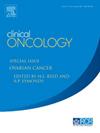Real World Outcomes in Patients With Recurrent, Advanced, or Metastatic Endometrial Cancer Treated With Lenvatinib Plus Pembrolizumab
IF 3.2
3区 医学
Q2 ONCOLOGY
引用次数: 0
Abstract
Aims
Patients with endometrial cancer who progress following first line therapy have improved survival outcomes with pembrolizumab and lenvatinib (pem/len) compared with standard of care chemotherapy, as demonstrated in KEYNOTE-775. This was in a group of trial patients with good performance status and excluded those with carcinosarcoma histology. In KEYNOTE-775 pem/len was associated with significant toxicity, leading to dose reductions, treatment cessation, and patient morbidity. We set out to assess the tolerability, toxicity and outcomes following pem/len for patients with recurrent, advanced or metastatic endometrial cancer in a real-world setting.
Materials and methods
UK centres treating patients with pem/len for advanced endometrial cancer within the compassionate access programme were approached. Retrospective data were analysed for those treated between May 2022 and June 2023. Data on patient demographics, treatment, toxicity and outcomes were extracted from medical records. Toxicity and tolerability were compared in those over and under the age of 70.
Results
Seven centres returned data for 70 patients. Median age of patients was 68.5 years (range 45–85) with a performance status of 0–1 in 77.1% and of 2 in 22.9%. Histological subtypes included serous (34.3%), endometrioid (32.9%), carcinosarcoma (14.3%), clear cell (7.1%), mixed (2.9%) and other (8.6%). Grade ≥3 toxicity was reported in 55.7% with any-grade toxicity observed in 85.7%. In those aged ≥70 years (n = 30) the rate of grade ≥3 toxicity was 60.0%. Rates of dose reduction of lenvatinib were 64.3%, and toxicity-related treatment interruption was 45.7%. The 6-month progression-free and overall survival rates were 54.0% (95%CI: 39.0–66.8) and 70.1% (95%CI:56.5–80.1) respectively.
Conclusion
This real-world, observational study of pem/len showed comparable tolerability, toxicity, and outcomes to previously reported clinical trial data. Our cohort included patients with a poorer PS and a broader range of histological subtypes including carcinosarcoma.
用伦伐替尼加 Pembrolizumab 治疗复发性、晚期或转移性子宫内膜癌患者的实际疗效。
目的:KEYNOTE-775试验表明,与标准疗法化疗相比,使用pembrolizumab和lenvatinib(pem/len)治疗一线治疗后病情进展的子宫内膜癌患者的生存率更高。这是在一组表现状况良好的试验患者中进行的,并排除了组织学为癌肉瘤的患者。在 KEYNOTE-775 试验中,pem/len 具有明显的毒性,导致剂量减少、治疗停止和患者发病。我们试图在真实世界中评估复发性、晚期或转移性子宫内膜癌患者接受 pem/len 治疗后的耐受性、毒性和疗效:我们联系了英国的一些中心,这些中心在同情性准入计划范围内使用培美/伦治疗晚期子宫内膜癌患者。对 2022 年 5 月至 2023 年 6 月期间接受治疗的患者的回顾性数据进行了分析。从医疗记录中提取了有关患者人口统计学、治疗、毒性和结果的数据。对 70 岁以上和 70 岁以下患者的毒性和耐受性进行了比较:七个中心共提供了 70 名患者的数据。患者的中位年龄为 68.5 岁(45-85 岁不等),77.1% 的患者表现为 0-1,22.9% 的患者表现为 2。组织学亚型包括浆液性(34.3%)、子宫内膜样(32.9%)、癌肉瘤(14.3%)、透明细胞(7.1%)、混合型(2.9%)和其他(8.6%)。55.7%的患者出现≥3级毒性,85.7%的患者出现任何级别的毒性。在年龄≥70岁的人群中(n = 30),≥3级毒性发生率为60.0%。来伐替尼剂量减少率为64.3%,与毒性相关的治疗中断率为45.7%。6个月无进展生存率和总生存率分别为54.0%(95%CI:39.0-66.8)和70.1%(95%CI:56.5-80.1):这项关于 pem/len 的真实世界观察性研究显示,其耐受性、毒性和结果与之前报告的临床试验数据相当。我们的队列中包括了PS较差的患者和更广泛的组织学亚型,包括癌肉瘤。
本文章由计算机程序翻译,如有差异,请以英文原文为准。
求助全文
约1分钟内获得全文
求助全文
来源期刊

Clinical oncology
医学-肿瘤学
CiteScore
5.20
自引率
8.80%
发文量
332
审稿时长
40 days
期刊介绍:
Clinical Oncology is an International cancer journal covering all aspects of the clinical management of cancer patients, reflecting a multidisciplinary approach to therapy. Papers, editorials and reviews are published on all types of malignant disease embracing, pathology, diagnosis and treatment, including radiotherapy, chemotherapy, surgery, combined modality treatment and palliative care. Research and review papers covering epidemiology, radiobiology, radiation physics, tumour biology, and immunology are also published, together with letters to the editor, case reports and book reviews.
 求助内容:
求助内容: 应助结果提醒方式:
应助结果提醒方式:


